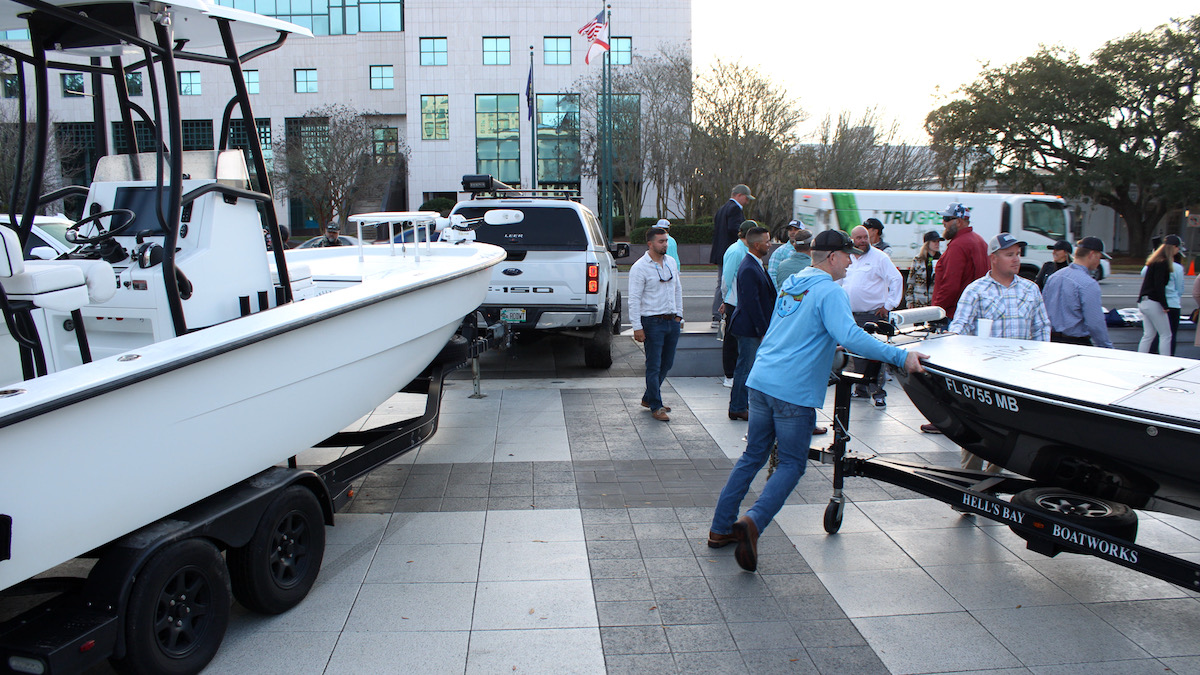100-Plus Florida Fishing Guides Rally at Capitol To Protest Bad Everglades Legislation
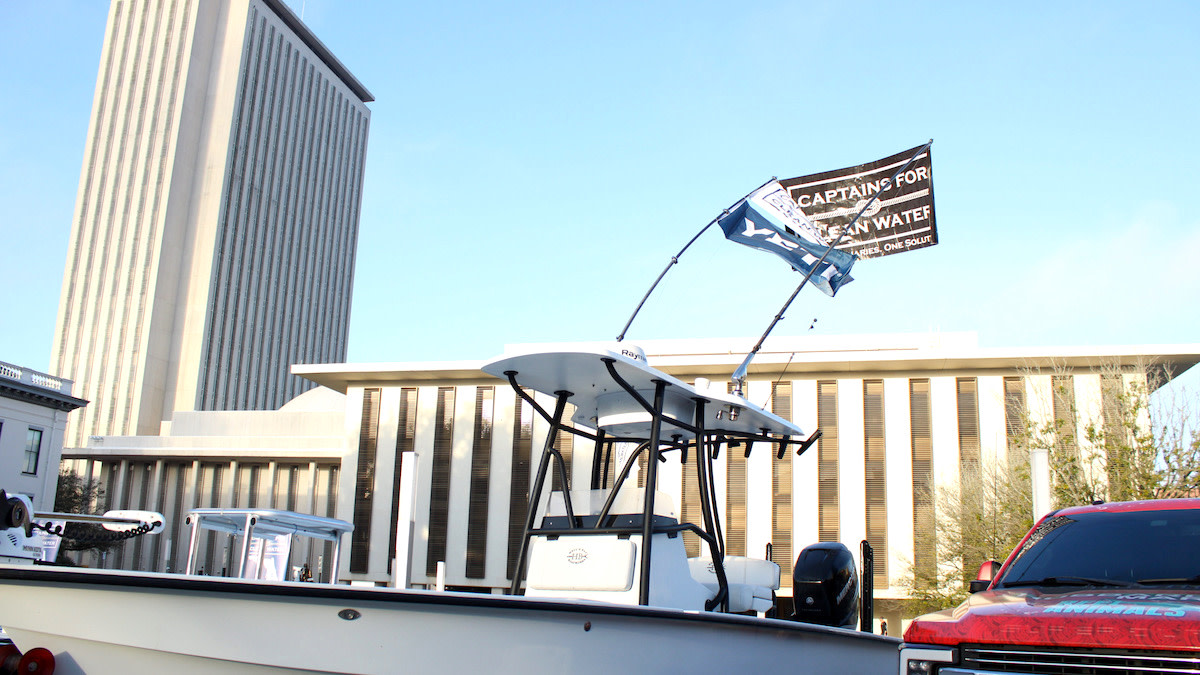
Standing outside the capitol, surrounded by an impressive fleet of skiffs and fishing royalty, I realized passerbys on the main drag must be pretty intrigued by the growing group of individuals I was standing amongst. Some were wearing cowboy boots, jeans, and suit jackets, while others had on the standard fishing guide garb: UV protective shirts and pants.
Beyond ideals, one thing superficially unified the aggregation. Damn-near everyone was wearing a hat. It was a stark comparison to the typical drab of suits, ties, dresses, and heels at the capitol. Although Captains for Clean Water (CFCW) was instrumental in the organization of this event, they didn’t necessarily account for everyone in attendance, so the group quickly became referred to as “the hats.” As in “sorry I’m late, the damn hats at the capitol were holding up security” or “did you see the hats at the capitol, they parked boats out on the front lawn!”
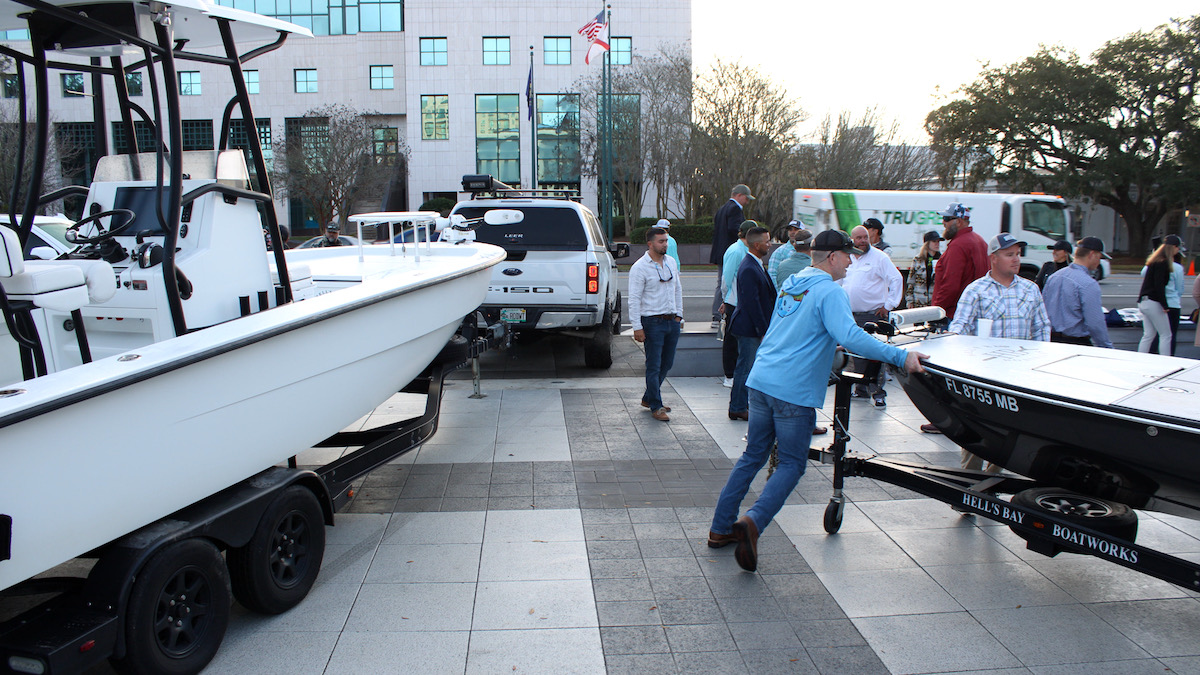
Fishermen are an easy-to-please species: All it takes is being on the water and catching fish to make us happy. But if something threatens the ecosystems that deliver our happiness—and in the case of guides, their livelihoods—we’re going to come out guns-a-blazing to defend the waters that make us who we are.
That’s why on Feb. 17, over a hundred guides from all reaches of Florida rallied at the capitol in Tallahassee to protest Senate Bill 2508.
What is SB 2508 and Why is it Pissing Off Fishermen? On Feb. 4, the Senate introduced SB 2508 as a “budget conforming bill.” Essentially, this means that the bill is a part of a budget procedure and therefore is not intended to undergo substantial policy change. It fast-tracks the bill to a vote on the Senate floor and allows only one opportunity for public comment.
And this political Trojan horse carried more than just a shady entrance. A deep dive into the language of the bill revealed an outdated 1940s approach to managing Florida’s waterways and over $300 million in Everglades restoration money held hostage by the bill’s passing.
“Rather than advancing legislation seeking to affect a major change in policy, SB 2508 is being rammed through the budget process, short-circuiting public engagement and leaving affected agencies in the dark,” Governor Ron DeSantis said in a public statement.
According to CFCW, "this bill is just one example of decades of similar political schemes intended to secure the interests of one powerful interest group—the industrial sugar industry, or ‘Big Sugar.’ For over 30 years, Big Sugar has employed the largest and most powerful lobbying force in Florida’s State Capitol.”
So why is Florida’s water such a politically charged issue to begin with? Most of it centers around control over the flows in and out of Lake Okeechobee. Where water previously ran southward down the Sunshine State, through the natural filtration system of the Everglades, it’s now rerouted—westward through the Caloosahatchee River to Pine Island Sound and eastward through the St. Lucie River to the Indian River Lagoon. This reroute effectively turned a swamp into agricultural land and opened up more areas for development. In addition to causing irreversible environmental damage, this has turned dams, valves, and water levels into pawns of Florida’s politics.
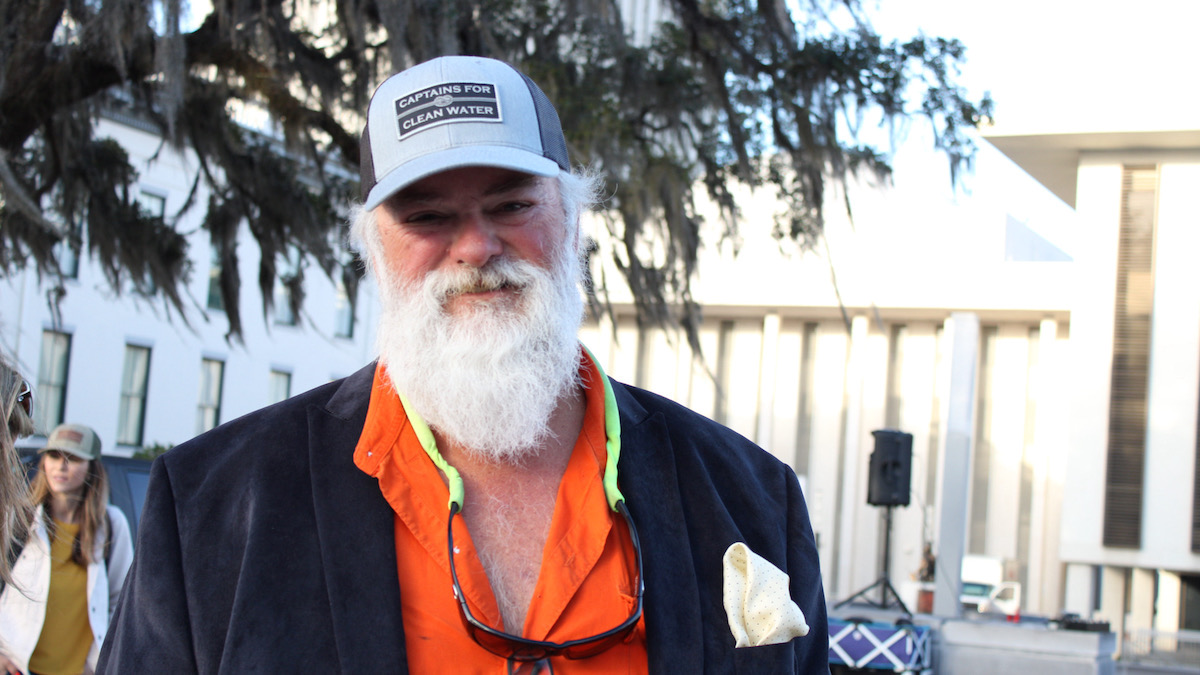
Captain Rufus Wakeman has been a fishing guide for over 35 years on the Indian River Lagoon, “what used to be the beautiful southern Indian River Lagoon teeming with life and grass up to your waist and all kinds of baitfish and gamefish, has now become a lunar landscape of nothing but death and sadness,” Wakeman told MeatEater.
This degradation is caused by harmful discharges flowing out of Okeechobee saturated with phosphorus from fertilizers used in golf course maintenance, agriculture, and lawn care. The result is a perfect storm for extreme toxic algae blooms. These blooms take the form of red tides in salt water due to the organism Karenia brevis. Blue-green algae, also known as cyanobacteria, occurs in freshwater and becomes a neurotoxin when it hits salt water, which endangers humans and marine life. To read more about this insanely complex issue, click here.
The algae multiply fast, consuming oxygen in the water at an alarming rate. Because of this, marine life is essentially suffocated to death during algal outbreaks. These toxic blooms cause massive fish kills. Because the algae is so thick, it blocks light from entering the water column so aquatic flora can’t properly photosynthesize. This means that larger fauna like manatees that are dependent on seagrass also suffer. Additionally, the cyanobacteria, combined with the dead plant matter left in its wake, leave a residual sludge behind that locals call “black mayonnaise.”
Captain Tyler Kapela has guided out of St. Petersburg for around a decade. He pointed out that aquatic ecosystems aren’t the only thing affected by these tides. Florida’s tourism economy is intrinsically tied to its shores, and no one wants to vacation on a beach covered in dead fish.
“These red tides wreak absolute havoc on our economy. In 2018 alone over $200 million was lost in three months between Sarasota and Marco Island. And that flows all the way up to us in Tampa Bay,” Kapela told MeatEater. “Dead fish as far as you can see some years. This year it killed manatees and dolphins. It’s unbelievably depressing and it’s all preventable.”
The Lake Okeechobee System Operating Manual (LOSOM) has undergone an extensive revamping since 2018 with the Army Corps of Engineers and the South Florida Water Management District (SFWMD). The goal of this process is to reroute water south and avoid harmful discharges that cause these blooms. A critical aspect of this is the Everglades Agricultural Area (EAA) reservoir. This reservoir allows for Lake O to remain at a lower level while still keeping water available for distribution.
CFCW, a grassroots nonprofit started by fishing guides, has fought tooth and nail for the protection of Florida’s waters since its inception in 2016. They were instrumental in getting SB 10 passed which allocates $64 million in an annual recurring budget specifically for the EAA reservoir.
The greatest issues presented by SB 2508 involves diluting funds directed to the EAA reservoir and maintaining Lake Okeechobee at a higher level–ensuring that storms cause more harmful discharges and limiting beneficial flows to the Everglades and the Caloosahatchee during the dry season.
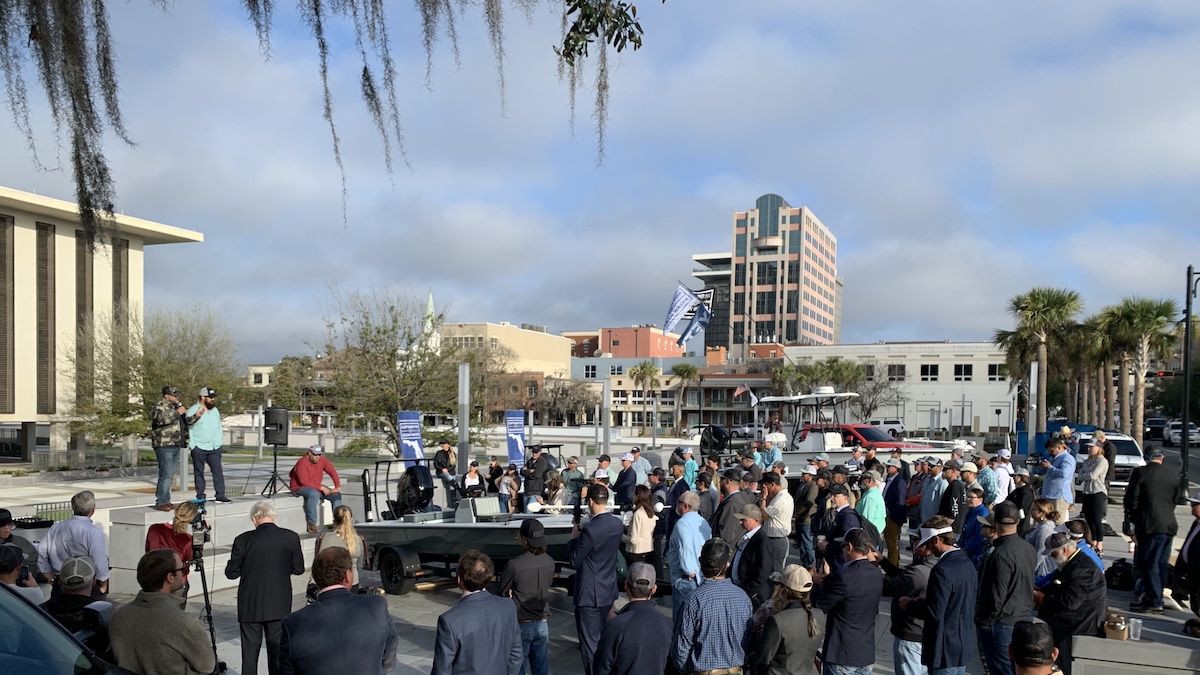
Hats in the Senate Concerned parties attended the Senate Appropriations Committee meeting held on Feb. 9, the only opportunity to voice their concerns regarding the bill. At this meeting, senators told citizens that they were misled, had shown up on a false premise, and brushed them off with a generally condescending tone.
“Fishing guides, outdoorsmen, and business owners took time to drive hours throughout the night to be here to be heard for just two minutes, only to be ridiculed and combatted,” Captain Chris Wittman, co-founder of CFCW, told MeatEater. “When they’re met with that kind of reception, they do not feel that they’re being heard. They do not feel that the actions of certain representatives are in the best interest of their constituents. It only fires them up more. What has happened between that meeting and today is proof of that.”
Tarpon season looms closely on the horizon for most of the guides at the rally, but they chose to be there instead. They chose to pull their boats into an urban mecca instead of a blue abyss. They chose to fight for the long-term preservation of the natural resources on which their lives depend instead of cashing in on an instant payout.
It’s not every day you get to witness a Senate procession, even for those heavily involved with politics. The Florida legislature meets every year for 60 consecutive days to sort out budgets, bills, and issues of extreme importance like what the state dessert should be.
As the minutes passed into hours in the capitol, the energy of the hats faded into exhaustion. It was divulged just that morning that SB 2508 was amended only the night before, the extent of which remained slightly mysterious.
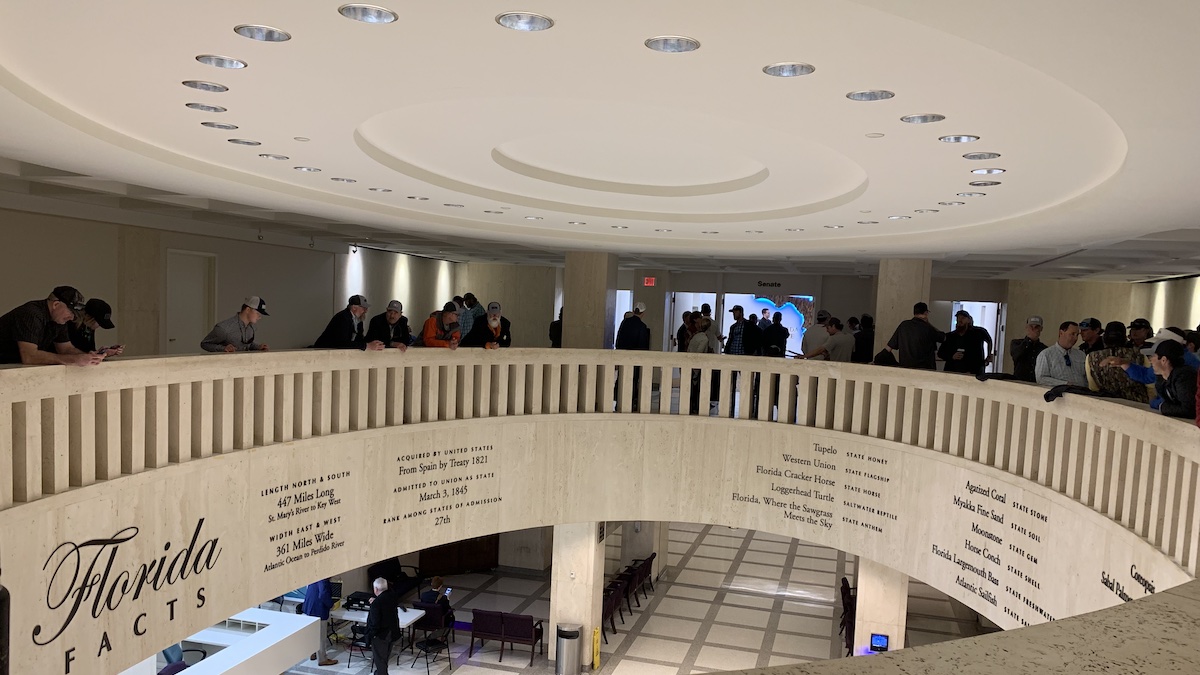
Debate drolled on without any sort of end in sight. When SB 2508 finally came up for discussion, the bill’s sponsor, Senator Ben Albritton, paraded it about the senate floor like a prize hog.
Albritton started out addressing the funds of the EAA reservoir. “There is nothing in that bill or in this amendment that changes the direction of spending: The sum of $64 million is appropriated and shall be transferred to the Everglade trust fund for the 2018, 19 fiscal years, and each fiscal year thereafter for the EAA reservoir project…the bill does not change, to be clear. There's no impact on the construction and finalization of the EAA reservoir.”
Senator Gayle Harell then asked Senator Albritton if this bill would result in more harmful discharges from Lake Okeechobee.
“I don't believe so, but here's the thing about harmful discharges or any kind of discharges at all. Who can predict, like the 2004-2005 storm season we had. Four different storms came over and wet the state like it hadn't been wet, probably ever? You can't predict those things. That's a fact, right?” Albritton responded.
While you might not necessarily be able to predict massive storm cycles in the long term, you can certainly make plans to keep Okeechobee at levels that are low enough to avoid discharges. Storms will undoubtedly continue to hit Florida year after year.
“So there are going to be discharges and there are discharges normally that help out with maintaining the right balance of water in the estuaries,” Albritton continued. “I don't see that in the bill. I've heard people say that it guarantees that we're going to have prolonged harmful discharges. But I don't believe that. No, ma'am, I don't.”
Senators have a lot on their plate, but this adamant lack of knowledge just verifies that water management has no place in a budget bill. This should have been presented to the SFWMD and given adequate time for public comment.
“That’s exactly why this type of budget process should not be used for major policy changes—it limits opportunity for analysis and stifles public engagement,” CFCW Co-founder Daniel Andrews said in an official statement.
The bill passed with 37 yeas and 2 nays. After the last vote came in, the hats got up in unison and exited the capitol without much to say.
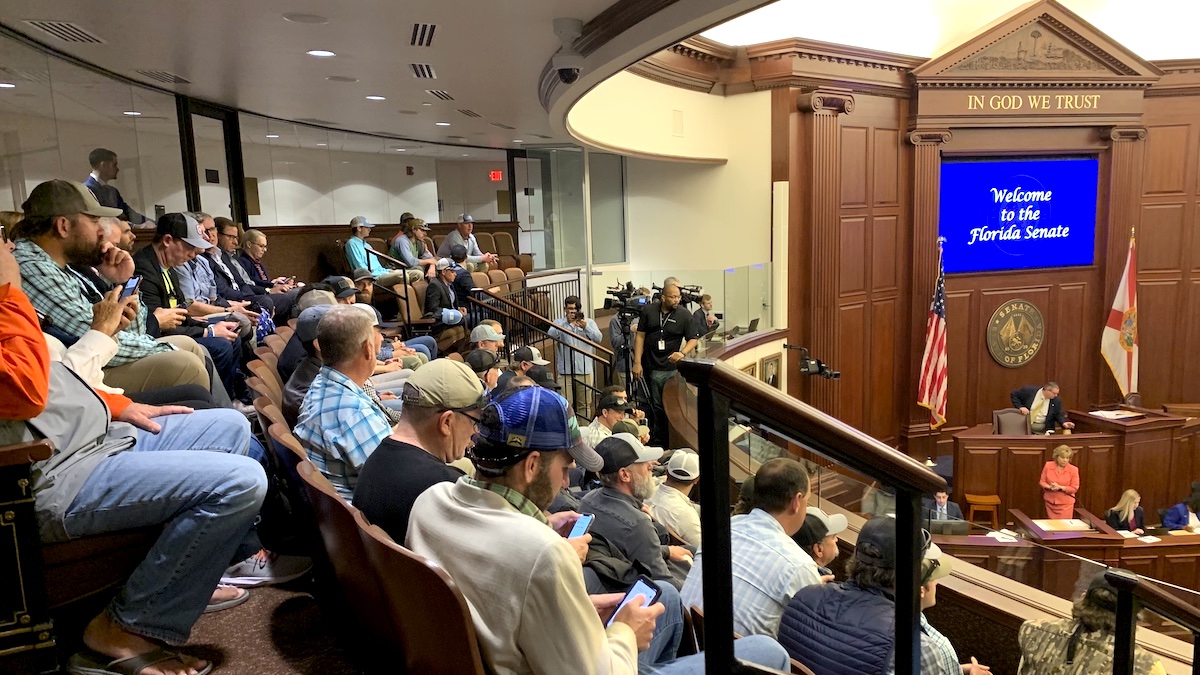
A ‘W’ with More Work to Come Captain Benny Blanco is the voice of Florida Bay. Six years ago, Captain Blanco met Captains Andrews and Wittman in the capitol building fighting for the reduction of discharges from Okeechobee from the West coast. Although they hailed from different areas of the state, they quickly found out that all of their issues to be inherently connected.
“Like every other fight in this country, when you connect the communities that are engaged, strong, and want to make a difference, we create a movement. And that’s what we’ve done here,” Blanco told MeatEater. “It started out small, but we got the first bill passed, SB 10, in 2017. There were only five of us, and we called for everybody just like we did here today, but five of us showed up. The difference is that we’ve been educating, we’ve been fighting, and we’ve been making progress.”
It’s striking to see just how much progress really is being made. Although the Senate Appropriations Committee might have seemed like a wasted effort at the time, the bill was amended the night before it reached the floor of the senate. Clearly, an impact was made.
“We’re making history. It’s more than just about the Everglades. The Everglades are why we’re here right now, but the reality is that this is about the outdoor industry putting their foot down,” Blanco said. “We’re done with special interests paying their way and figuring out ways to return on investments over the health of our environment. And in Florida, the environment is our economy, raking in $130 billion a year. What we’ve found out over the last six years is that if we don’t fight for it, no one will.”
MeatEaters own and author of That Wild Country, Mark Kenyon mirrored this sentiment and extended it to hunting and other outdoor pursuits: Now is not the time to be complacent.
"It's tempting these days to grow depressed in the face of the nearly daily onslaught of bad news in the world of hunting, fishing, and the environment. It's times like these when I need to remind myself of Yvon Chouinard's frequent motto, that the only cure for depression is action,” Kenyon said. “Despite shady politics and looming corporate interests, a group of passionate outdoors people rallied together, made their voices heard, and forced positive change. Hell yes! Our voices still matter. We can no longer just be anglers or hunters or kayakers or runners. It's time to add ‘advocate’ to our resume. Just look to Tallahassee to see why."
After escaping the suffocating senate room, I found the company of Captain Bob Branham, a recently retired fishing guide out of Biscayne Bay, who’s fought for the protection of Florida’s waterways for over 40 years. Leaned up against a boat with the capitol building looming in the background, Captain Bob described to me how much things have changed in his time, how hard it has been to watch the extreme detriment over the last decade, and just how frustrating it can be to get involved with policy. When I asked him why he was still showing up, he answered with a laugh and with a spark in his eye. “Miracles happen.”
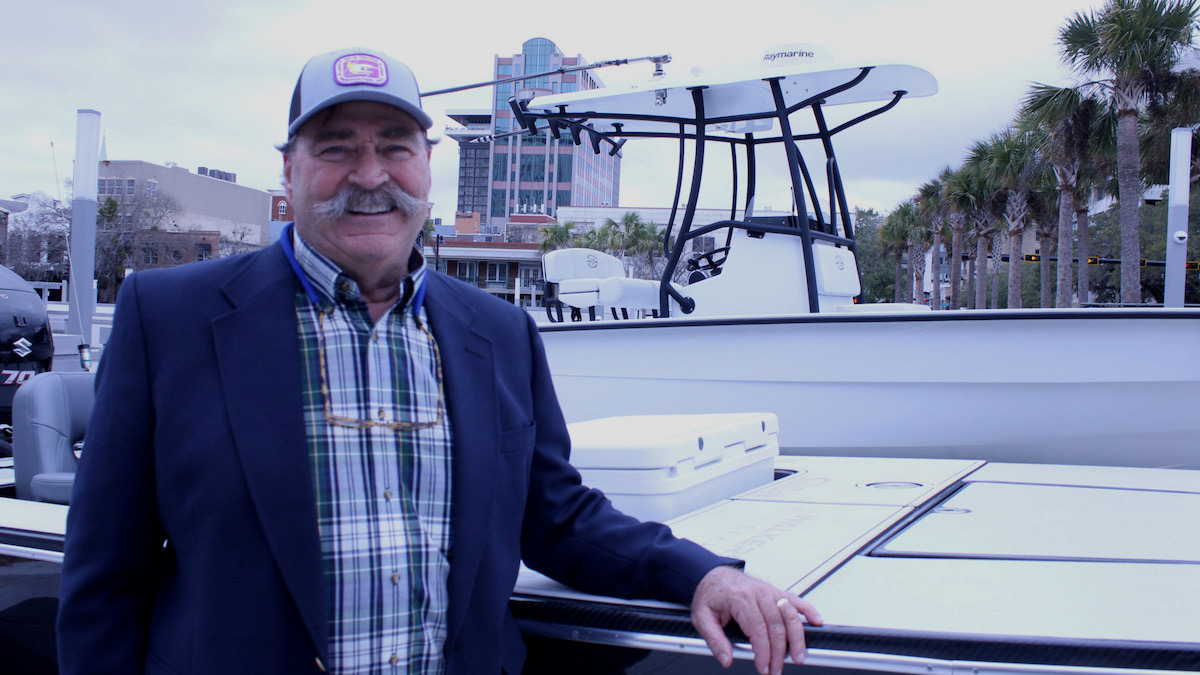
I realized at that moment that maybe a miracle had in fact happened. Despite leaving the Senate hearing feeling downtrodden with the bill’s passing, it would have slipped through without amendment if it hadn’t been for the gathering of these like-minded people voicing their concerns. There was undeniable electric energy at that rally, and it felt good to be a pain in the ass. When you get that many fired-up folks together in one area, you can feel a charged current in the air.
“We need to make our voice heard in the house,” Wittman concluded. “That voice needs to be one of encouragement. This was a huge win, and we need to encourage others to get on board with us and make sure that this bill stays where it is and gets better. It’s no time to let our foot off the gas.”
To sign the CFCW petition, click here. This movement received support from around the country. CFCW supported Alaska throughout the pebble mine fiasco, and that support was reciprocated. As conservationists and public landowners, it’s important to remember that those public lands extend beyond our own backyards.
“Make no mistake, our opposition to SB 2508 remains. Even with this late-filed amendment, SB 2508 is still a net negative for Florida’s environment and waterways,” Andrews said. “Keep up the momentum. Your voice has made a difference. This battle is not over and the war is far from over. We must continue to increase the pressure until the Everglades have been restored and our communities and waterways are no longer poisoned with toxic discharges.”
